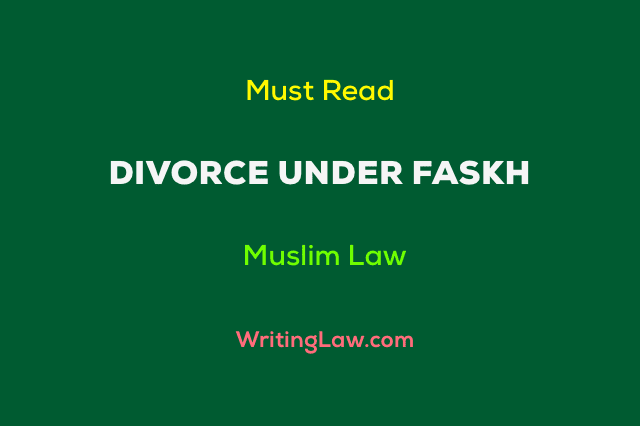
Faskh means cancellation, abolishment, recision, revocation and abrogation annulment. Under Muslim law, a lady can move towards Qazi for dissolving her marriage. This can be done when husband and wife both conclude that they cannot live together as husband and wife. The Qazi, after a thorough analysis, terminates the marriage.
Before the Dissolution of Muslim Marriage Act, 1939 came into force; there was no law or legislation under which a Muslim woman could plead for the dissolution of her marriage. Accordingly, she could plead for the dissolution of her marriage under the doctrine of Faskh only.
Following were the main reasons for dissolving the marriage at the wife’s wish:
(a) the marriage is irregular.
(b) the person who has the option of avoiding marriage has exercised his option.
(c) the marriage was performed within prohibited degrees.
(d) the marriage is contracted by non-Muslims, with parties adopting Islam.
Recent judgement on the dissolution of marriage in Muslim
Recently, the High Court discussed the various modes of dissolution of marriage in a detailed manner in a judgement. The Bench first discussed the general modes of dissolution in Muslim personal law and then discussed the modes particularly available to women. The court explained the modes that are available to a woman are:
- Talaq-e-tafwiz, where the wife can dissolve the marriage if her husband fails to keep his end of the marriage contract.
- Khula, where a wife can unilaterally divorce her husband by returning his Dower.
- Mubara’at, dissolution by mutual consent, and
- Faskh, dissolution with the intervention of a third person such as a Qazi.
The court has noted that Section 2 of the Shariat Act mainly recognized all modes of extra-judicial divorce except Faskh.
In KC Moyin vs Nafeesa, 1972, the High Court had contended that a woman could only make use of remedies under the Dissolution of Muslim Marriages Act and could not request remedies under personal law (extra-judicial remedies).
In Raseena Pareekunju vs Muhammed Asif, the court has disagreed with the above statement after examining the provisions of the dissolution of the Muslim Marriage Act and has ruled that:
“On an overall analysis of the scheme of the Shariat Act as well as the Dissolution of Muslim Marriages Act as above, we are of the considered view that the Dissolution of Muslim Marriages Act restrict Muslim women to annul their marriage invoking Faskh except through the intervention of the Court. All other forms of extra-judicial divorce as referred to in Section 2 of the Shariat Act are thus available to a Muslim woman. We, therefore, hold that the law declared in KC Moyin’s case (supra) is not good law”.
Earlier, a Muslim woman could plead for the dissolution of her marriage under the doctrine of Faskh only, and she was not allowed to request remedies under personal law (extra-judicial remedies). With the passing of recent judgement (Raseena Pareekunju vs Muhammed Asif), the Kerala High Court overrules a 49 year old verdict that a woman could only make use of remedies under the Dissolution of Muslim Marriages Act and could not request remedies under personal law (extra-judicial remedies). As of now, a Muslim woman can now dissolve or end her marriage via four modes, that are:
- Talaq-e-tafwiz
- Khula
- Mubarat, and
- Faskh
Read Next:
- Cases Related to Grounds for Dissolution of Muslim Marriage
- Cases Related to Muslim Women Protection of Rights on Divorce Act
- Understanding the Legislative Branch of the Indian Government - 6th May 2024
- Appointment, Oath, and Removal of Constitutional Posts in India - 28th April 2024
- Powers of Income Tax Authorities in India - 26th April 2024







